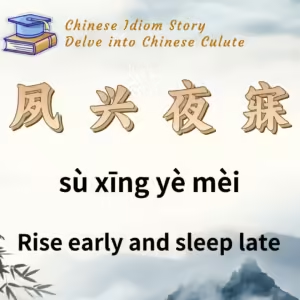
Chinese Idiom: 夙兴夜寐 (Su Xing Ye Mei)
English Translation: Rise early and sleep late
pīn yīn: sù xīng yè mèi
Idiom Meaning: This idiom describes the practice of waking up early and going to bed late, indicating hard work and diligence.
Historical Source: 《诗经 · 卫风 · 氓》 (Book of Songs · Wei Feng · The Mournful Woman).
Idiom Story:
In the poem “The Mournful Woman,” the fifth chapter recounts the plight of a woman who has been abandoned by her husband. She reflects on her hardships and the cruel treatment she endured during her marriage. The lines state:
“三岁为妇,靡室劳矣;夙兴夜寐,靡有朝矣!”
“Since I became your wife for three years, I have toiled without rest; I rise early and sleep late, with no day free from work!”
In this context, the woman expresses her unwavering dedication to her household duties. She describes how, despite her relentless efforts, her husband becomes cruel and unkind once his desires are fulfilled.
The poem continues:
“言既遂矣,至于暴矣;兄弟不知,喹其笑矣!”
“Once your wishes were fulfilled, you became harsh; my brothers do not know this and only laugh at my plight!”
Here, she laments that her brothers are unaware of her suffering and instead mock her situation. She reflects on her loneliness and sorrow, concluding with the line:
“静言思之,躬自悼矣。”
“Quietly contemplating this, I can only grieve alone.”
Through this poignant story, the idiom “夙兴夜寐” captures the essence of hard work and dedication, emphasizing the sacrifices made in the face of unkindness and neglect.






